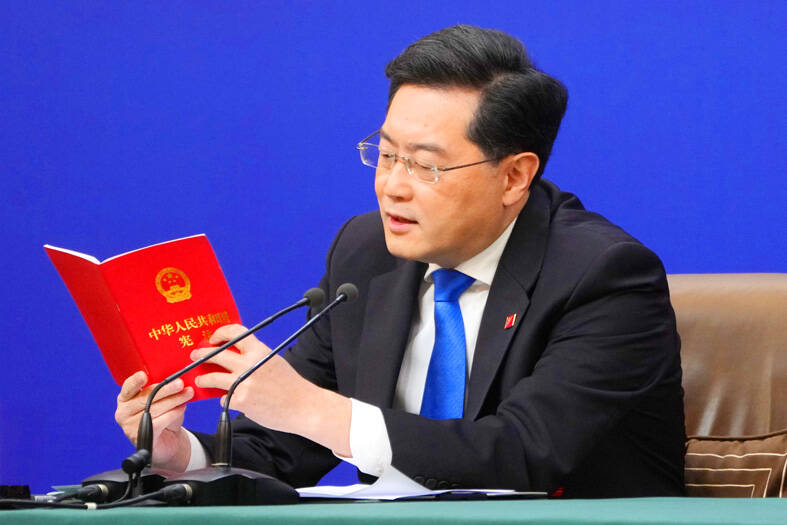Chinese Minister of Foreign Affairs Qin Gang (秦剛) yesterday warned that Beijing and Washington are headed for “conflict and confrontation” if the US does not change course, striking a combative tone at a moment when relations between the rivals are at a historic low.
In his first news conference since taking office late last year, Qin’s harsh language appeared to defy predictions that China might abandon its aggressive “wolf warrior” diplomacy in favor of more moderate rhetoric as the two countries face off over trade and technology, Taiwan, human rights and Russia’s invasion of Ukraine.
Washington’s China policy has “entirely deviated from the rational and sound track,” Qin told journalists on the sidelines of the National People’s Congress.

Photo: AP
“If the United States does not hit the brake, but continues to speed down the wrong path, no amount of guardrails can prevent derailing and there surely will be conflict and confrontation,” Qin said. “Such competition is a reckless gamble, with the stakes being the fundamental interests of the two peoples and even the future of humanity.”
Qin’s comments echoed remarks made by Chinese President Xi Jinping (習近平) in a speech on Monday to the annual congress.
“Western countries led by the United States have implemented all-round containment, blockade and suppression of China, which has brought unprecedented grave challenges to our nation’s development,” Xi was quoted as saying by Xinhua news agency.
In the face of that, China must “remain calm, maintain concentration, strive for progress while maintaining stability, take active actions, unite as one, and dare to fight,” he said.
US officials have grown increasingly worried about China’s expansive political and economic goals and the possibility of war over Taiwan — and many officials in Washington have called for the US to make a bigger effort to counter Chinese influence abroad.
In recent weeks, concerns about Chinese spying on the US and Beijing’s influence campaigns there have drawn particular concern, and officials from the two countries have frequently traded accusations.
Qin criticized Washington for shooting down the balloon, repeating claims that its appearance in US skies was an accident.
“In this case the United States’ perception and views of China are seriously distorted. It regards China as its primary rival and the most consequential geopolitical challenge,” Qin said. “This is like the first button in a shirt being put wrong and the result is that the US-China policy has entirely deviated from the rational and sound track.”
On Taiwan, Qin called the issue the first red line that must not be crossed.
“The US has unshakable responsibility for causing the Taiwan question,” he said, accusing the US of “disrespecting China’s sovereignty and territorial integrity” by offering Taiwan political backing and furnishing it with defensive weapons in response to Beijing’s threats.
“Why does the US ask China not to provide weapons to Russia, while it keeps selling arms to Taiwan?” Qin asked.
Beijing has also accused the West of “fanning the flames” by providing Ukraine with weaponry to fend off the Russian invasion. A Chinese call for a ceasefire in Ukraine that has drawn praise from Russia, but dismissals from the West has done nothing to lessen tensions as US officials have repeatedly accused China of considering providing weapons to Moscow for use in the war.
“Efforts for peace talks have been repeatedly undermined. There seems to be an invisible hand pushing for the protraction and escalation of the conflict and using the Ukraine crisis to serve a certain geopolitical agenda,” Qin said.

The brilliant blue waters, thick foliage and bucolic atmosphere on this seemingly idyllic archipelago deep in the Pacific Ocean belie the key role it now plays in a titanic geopolitical struggle. Palau is again on the front line as China, and the US and its allies prepare their forces in an intensifying contest for control over the Asia-Pacific region. The democratic nation of just 17,000 people hosts US-controlled airstrips and soon-to-be-completed radar installations that the US military describes as “critical” to monitoring vast swathes of water and airspace. It is also a key piece of the second island chain, a string of

A magnitude 5.9 earthquake that struck about 33km off the coast of Hualien City was the "main shock" in a series of quakes in the area, with aftershocks expected over the next three days, the Central Weather Administration (CWA) said yesterday. Prior to the magnitude 5.9 quake shaking most of Taiwan at 6:53pm yesterday, six other earthquakes stronger than a magnitude of 4, starting with a magnitude 5.5 quake at 6:09pm, occurred in the area. CWA Seismological Center Director Wu Chien-fu (吳健富) confirmed that the quakes were all part of the same series and that the magnitude 5.5 temblor was

Taiwan will now have four additional national holidays after the Legislative Yuan passed an amendment today, which also made Labor Day a national holiday for all sectors. The Chinese Nationalist Party (KMT) and Taiwan People’s Party (TPP) used their majority in the Legislative Yuan to pass the amendment to the Act on Implementing Memorial Days and State Holidays (紀念日及節日實施辦法), which the parties jointly proposed, in its third and final reading today. The legislature passed the bill to amend the act, which is currently enforced administratively, raising it to the legal level. The new legislation recognizes Confucius’ birthday on Sept. 28, the

The Central Weather Administration has issued a heat alert for southeastern Taiwan, warning of temperatures as high as 36°C today, while alerting some coastal areas of strong winds later in the day. Kaohsiung’s Neimen District (內門) and Pingtung County’s Neipu Township (內埔) are under an orange heat alert, which warns of temperatures as high as 36°C for three consecutive days, the CWA said, citing southwest winds. The heat would also extend to Tainan’s Nansi (楠西) and Yujing (玉井) districts, as well as Pingtung’s Gaoshu (高樹), Yanpu (鹽埔) and Majia (瑪家) townships, it said, forecasting highs of up to 36°C in those areas